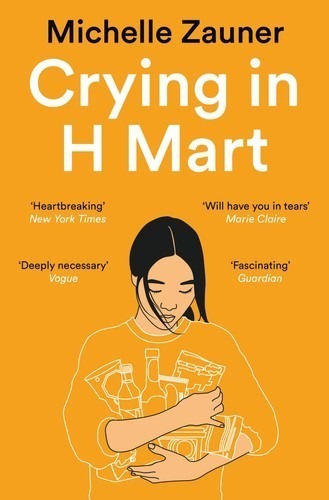Crying in H Mart
2.300,00 د.ج
One of Barack Obama’s Favorite Books of 2021
The New York Times bestseller from the Grammy-nominated indie rockstar Japanese Breakfast, an unflinching, deeply moving memoir about growing up mixed-race, Korean food, losing her Korean mother, and forging her own identity in the wake of her loss.
‘As good as everyone says it is and, yes, it will have you in tears. An essential read for anybody who has lost a loved one, as well as those who haven’t’ – Marie–Claire
In this exquisite story of family, food, grief, and endurance, Michelle Zauner proves herself far more than a dazzling singer, songwriter, and guitarist. With humour and heart, she tells of growing up the only Asian-American kid at her school in Eugene, Oregon; of struggling with her mother’s particular, high expectations of her; of a painful adolescence; of treasured months spent in her grandmother’s tiny apartment in Seoul, where she and her mother would bond, late at night, over heaping plates of food. As she grew up, moving to the east coast for college, finding work in the restaurant industry, performing gigs with her fledgling band – and meeting the man who would become her husband – her Koreanness began to feel ever more distant, even as she found the life she wanted to live.
It was her mother’s diagnosis of terminal pancreatic cancer, when Michelle was twenty-five, that forced a reckoning with her identity and brought her to reclaim the gifts of taste, language, and history her mother had given her.
Vivacious, lyrical and honest, Michelle Zauner’s voice is as radiantly alive on the page as it is onstage. Rich with intimate anecdotes that will resonate widely, Crying in H Mart is a book to cherish, share, and reread.
‘Possibly the best book I’ve read all year . . . I will be buying copies for friends and family this Christmas.’ – Rukmini Iyer in the Guardian ‘Best Food Books of 2021’
‘Wonderful . . . The writing about Korean food is gorgeous . . . but as a brilliant kimchi-related metaphor shows, Zauner’s deepest concern is the ferment, and delicacy, of complicated lives.’ – Victoria Segal, Sunday Times, ‘My favourite read of the year’
One of Barack Obama’s Favorite Books of 2021
The New York Times bestseller from the Grammy-nominated indie rockstar Japanese Breakfast, an unflinching, deeply moving memoir about growing up mixed-race, Korean food, losing her Korean mother, and forging her own identity in the wake of her loss.
‘As good as everyone says it is and, yes, it will have you in tears. An essential read for anybody who has lost a loved one, as well as those who haven’t’ – Marie–Claire
In this exquisite story of family, food, grief, and endurance, Michelle Zauner proves herself far more than a dazzling singer, songwriter, and guitarist. With humour and heart, she tells of growing up the only Asian-American kid at her school in Eugene, Oregon; of struggling with her mother’s particular, high expectations of her; of a painful adolescence; of treasured months spent in her grandmother’s tiny apartment in Seoul, where she and her mother would bond, late at night, over heaping plates of food. As she grew up, moving to the east coast for college, finding work in the restaurant industry, performing gigs with her fledgling band – and meeting the man who would become her husband – her Koreanness began to feel ever more distant, even as she found the life she wanted to live.
It was her mother’s diagnosis of terminal pancreatic cancer, when Michelle was twenty-five, that forced a reckoning with her identity and brought her to reclaim the gifts of taste, language, and history her mother had given her.
Vivacious, lyrical and honest, Michelle Zauner’s voice is as radiantly alive on the page as it is onstage. Rich with intimate anecdotes that will resonate widely, Crying in H Mart is a book to cherish, share, and reread.
‘Possibly the best book I’ve read all year . . . I will be buying copies for friends and family this Christmas.’ – Rukmini Iyer in the Guardian ‘Best Food Books of 2021’
‘Wonderful . . . The writing about Korean food is gorgeous . . . but as a brilliant kimchi-related metaphor shows, Zauner’s deepest concern is the ferment, and delicacy, of complicated lives.’ – Victoria Segal, Sunday Times, ‘My favourite read of the year’
| Editeur |
|---|
Produits similaires
The Uninhabitable Earth: A Story of the Future
'An epoch-defining book' Matt Haig
'If you read just one work of non-fiction this year, it should probably be this' David Sexton, Evening Standard
It is worse, much worse, than you think.
The slowness of climate change is a fairy tale, perhaps as pernicious as the one that says it isn't happening at all, and if your anxiety about it is dominated by fears of sea-level rise, you are barely scratching the surface of what terrors are possible, even within the lifetime of a teenager today.
Over the past decades, the term "Anthropocene" has climbed into the popular imagination - a name given to the geologic era we live in now, one defined by human intervention in the life of the planet. But however sanguine you might be about the proposition that we have ravaged the natural world, which we surely have, it is another thing entirely to consider the possibility that we have only provoked it, engineering first in ignorance and then in denial a climate system that will now go to war with us for many centuries, perhaps until it destroys us. In the meantime, it will remake us, transforming every aspect of the way we live-the planet no longer nurturing a dream of abundance, but a living nightmare.









